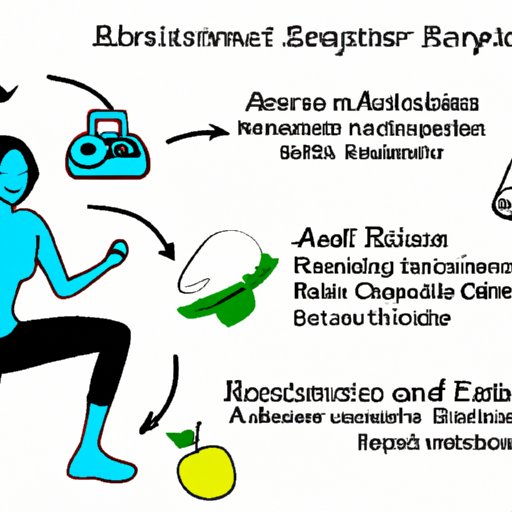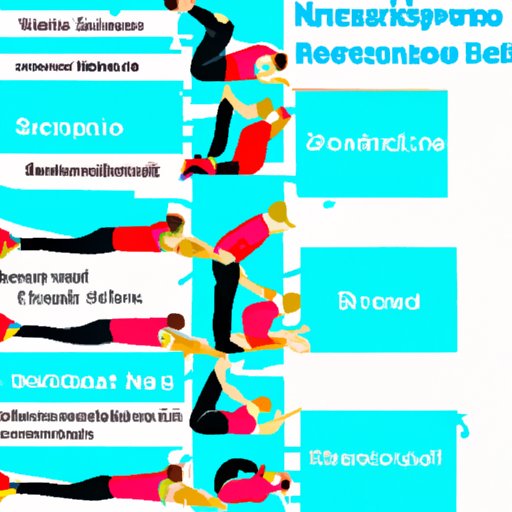Introduction
Stress is a natural response to life’s challenges. It’s the body’s way of preparing us to take on difficult tasks or handle difficult emotions. While mild stress can be beneficial in small doses, chronic or severe stress can be detrimental to both physical and mental health. Fortunately, exercise can be an effective tool to help reduce stress levels.
Physiological Effects of Exercise on Stress Hormones
Physical activity has been found to lower cortisol levels, which is the body’s primary stress hormone. High levels of cortisol can lead to weight gain, sleep disturbances, and other health problems. Research has also shown that exercise can help regulate adrenaline and other hormones that are released during times of stress.

Tips for Using Exercise to Reduce Stress Levels
There are many different types of exercises that can be used to reduce stress levels. Aerobic exercises such as running, swimming, cycling, and walking can help to reduce stress by releasing endorphins, which are hormones that can boost your mood and reduce feelings of stress. Strength training can help you build muscle and increase your overall fitness level, while stretching can help to loosen tight muscles and promote relaxation.

Psychological Benefits of Regular Physical Activity
In addition to physiological benefits, regular physical activity can also have a positive effect on mental health. Exercise has been found to improve mental clarity and focus, as well as enhance concentration. It can also improve mood and motivation, allowing individuals to better manage their stress. According to a study published in the journal Psychosomatic Medicine, “physical activity is associated with improved psychological functioning, including reduced anxiety and depression.”
Types of Exercises that Can Be Used to Reduce Stress
Aerobic exercises such as running, swimming, cycling, and walking are all great ways to reduce stress levels. Strength training can help to build muscle and increase overall fitness, while yoga and stretching can help to loosen tight muscles and promote relaxation. It’s important to remember that everyone responds differently to different types of exercise, so it’s important to find something that works for you.

Role of Nutrition in Reducing Stress Through Exercise
Nutrition plays an important role in reducing stress through exercise. Eating a healthy diet full of whole foods can provide the body with the nutrients it needs to cope with stress. Eating foods high in vitamins and minerals such as fruits and vegetables can help to boost energy levels and support the body’s natural processes. Additionally, certain supplements such as omega-3 fatty acids and B vitamins can help to reduce stress levels.

Success Stories of People Who Have Used Exercise to Reduce Stress
There are countless success stories of people who have used exercise to reduce their stress levels. One such story is that of Sarah, a busy working mom who was struggling with stress. Sarah started running three times a week and after just a few months, she noticed a significant decrease in her stress levels. She was able to better manage her stress and felt more energized and motivated.
Research Studies Investigating the Effects of Exercise on Stress
Several research studies have investigated the effects of exercise on stress. A study published in the journal Psychosomatic Medicine found that “regular physical activity is associated with improved psychological functioning, including reduced anxiety and depression.” Another study published in the Journal of Behavioral Medicine concluded that “exercise is an effective intervention for stress reduction.” These findings suggest that regular physical activity can be an effective tool for managing stress.
Conclusion
Exercise is a powerful tool to help reduce stress levels. It can help to lower cortisol levels, regulate adrenaline and other hormones, and improve mental clarity. Furthermore, there are many different types of exercises that can be used to reduce stress, such as aerobic exercise, strength training, and yoga. Finally, eating a healthy diet full of whole foods can help to support the body’s natural processes and reduce stress levels.
In conclusion, regular physical activity can be an effective tool for managing stress. It’s important to remember that everyone responds differently to different types of exercise, so it’s important to find something that works for you.
(Note: Is this article not meeting your expectations? Do you have knowledge or insights to share? Unlock new opportunities and expand your reach by joining our authors team. Click Registration to join us and share your expertise with our readers.)
